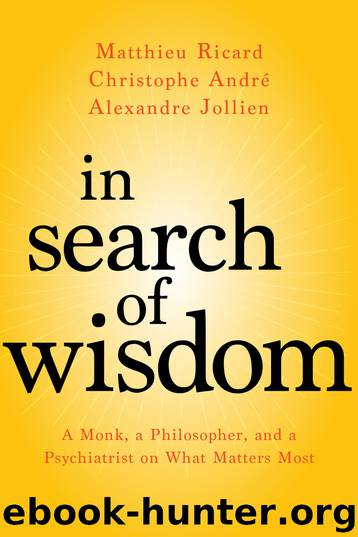In Search of Wisdom by Matthieu Ricard

Author:Matthieu Ricard
Language: eng
Format: epub
Publisher: Sounds True
ALEXANDREI could only dream of such a compassionate and on-the-dot therapist as that. Because there are two dangers: betting the farm on your will, or the opposite — abdicating and giving up. Voluntarism, believing completely in our willpower, ignores our limits. This is the famous problem treated by many philosophers of the weakness of the will and of the difficulty of changing in the down-to-earth circumstance of daily life. It’s as if the heavy force of inertia were preventing us from making progress, as though there were some kind of thermostat inside us that maintains our old habits against all winds and tides, even though this status quo is painful to us. Though I know well enough that a certain behavior is harmful, I can hardly wait to go and do it anyhow. But resignation is no better — just throwing up your hands is a kind of self-abuse. Nothing is worse when we’re suffering than the feeling that we’re paralyzed and can’t do anything about it. If I consult a doctor, I’m sure to leave his office with some solution, as minimal as it might be — some piece of advice, some tool, an exercise. Throughout our lives the possibility of making progress persists. Even on our deathbeds we can liberate ourselves, transform inwardly. The practice of meditation remains available, whatever our problems. Often when the doctor could no longer do anything, I have found in spiritual practice a way of opening up a horizon.
In order to make progress, why not imitate the Buddha, who, like a doctor, gives a diagnosis? Unhappiness initially pushes me in the direction of wisdom. If I examine the path I have traveled, I have to admit that at the beginning I did not practice meditation for altruistic reasons but because of radical discontent and an inability to live in the present moment. Paradoxically, I think I have more ability to face the blows of fate than to take on the little problems of everyday life and to appreciate happiness when it is there. It’s almost tragic, but it seems to me much easier to accept my disability because I have no choice, there’s no cure for it. If I glimpsed the least hope of a cure, I would knock on every door and shout my SOS in all directions. But there is something comforting, almost soothing, in telling myself that there’s no use in getting worked up about it. By contrast, where I sense that it would be possible for me to improve things, immediately I begin putting out a total effort. Deciding what to try to overcome and what to accept takes tremendous judgment and discretion. And here Epictetus provided me with a precious tool, by showing that each day I have to clearly distinguish between what depends on me and what doesn’t. Speaking of Epictetus, he presented himself as “a slave on the road to freedom.” In my turn, I could ask myself, “What am I a slave of? What are
Download
This site does not store any files on its server. We only index and link to content provided by other sites. Please contact the content providers to delete copyright contents if any and email us, we'll remove relevant links or contents immediately.
The Four Agreements by Don Miguel Ruiz(6729)
Flow by Mihaly Csikszentmihalyi(4666)
The Four Tendencies by Gretchen Rubin(4587)
Adulting by Kelly Williams Brown(4552)
You Do You by Sarah Knight(4454)
The Hacking of the American Mind by Robert H. Lustig(4355)
Ikigai by Héctor García & Francesc Miralles(4219)
Right Here, Right Now by Georgia Beers(4187)
A Simplified Life by Emily Ley(4145)
The Art of Happiness by The Dalai Lama(4116)
The Power of Positive Thinking by Norman Vincent Peale(4045)
The Little Book of Hygge by Meik Wiking(3672)
The French Women Don't Get Fat Cookbook by Mireille Guiliano(3644)
The Heroin Diaries by Nikki Sixx(3534)
The Courage to Be Disliked by Ichiro Kishimi & Fumitake Koga(3469)
The Choice by Edith Eva Eger(3464)
Why Buddhism is True by Robert Wright(3434)
Spark Joy by Marie Kondo(3284)
Make Your Bed by William H. Mcraven(3166)
